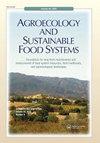Typology and social network of grassroots initiatives that promote agroecology in Mexico
IF 2.6
3区 农林科学
Q1 AGRICULTURE, MULTIDISCIPLINARY
引用次数: 0
Abstract
ABSTRACTThe study aims to typify the diversity of grassroots initiatives in Mexico, the circumstances (e.g. historical, social, ecological) in which they emerge, and the roles and power relationships they establish with different stakeholders to promote agroecology. It addresses the need to comprehend how grassroots initiatives contribute to social change and the massification of agroecology in Mexico. Analysis was done using PCA and social network analysis from 167 surveys. Results show that grassroots initiatives impact 18 indigenous groups in the center and south of Mexico, and focus on eco-friendly production, social justice, popular education, and food markets. Initiatives started because of three tipping points that responded to neoliberal policies, relocating local food and massifying agroecology. There are 13 types of stakeholders that promote agroecology and influence grassroots initiatives.KEYWORDS: Agroecologygrassroots initiativesMexicotypologysocial network Disclosure statementNo potential conflict of interest was reported by the author(s).Additional informationFundingThis work was supported by the Consejo Nacional de Humanidades Ciencia y Tecnología [12031014].促进墨西哥农业生态的基层倡议的类型和社会网络
摘要本研究旨在分析墨西哥基层倡议的多样性,它们产生的环境(如历史、社会、生态),以及它们与不同利益相关者在促进生态农业方面建立的角色和权力关系。它解决了理解基层倡议如何促进墨西哥社会变革和农业生态规模化的需要。分析使用PCA和社会网络分析167个调查。结果表明,基层倡议影响了墨西哥中部和南部的18个土著群体,重点关注生态友好型生产、社会正义、大众教育和食品市场。新自由主义政策引发了三个转折点,即重新安置当地粮食和大规模农业生态学。促进生态农业和影响基层倡议的利益相关者有13种类型。关键词:生态农业、基层倡议、墨西哥、类型学、社会网络披露声明作者未报告潜在的利益冲突。本研究由国家人道科学委员会通过Tecnología[12031014]提供支持。
本文章由计算机程序翻译,如有差异,请以英文原文为准。
求助全文
约1分钟内获得全文
求助全文
来源期刊

Agroecology and Sustainable Food Systems
AGRICULTURE, MULTIDISCIPLINARY-GREEN & SUSTAINABLE SCIENCE & TECHNOLOGY
CiteScore
4.80
自引率
7.70%
发文量
73
期刊介绍:
Agroecology and Sustainable Food Systems is devoted to the rapidly emerging fields of agroecology and food system sustainability. By linking scientific inquiry and productive practice with transformative social action, agroecology provides a foundation for developing the alternative food systems of the future. The journal focuses on the changes that need to occur in the design and management of our food systems in order to balance natural resource use and environmental protection with the needs of production, economic viability, food security, and the social well-being of all people.
Agroecology and Sustainable Food Systems examines our current food systems from production to consumption, and the urgent need to transition to long-term sustainability. The journal promotes the study and application of agroecology for developing alternatives to the complex problems of resource depletion, environmental degradation, a narrowing of agrobiodiversity, continued world hunger, consolidation and industrialization of the food system, climate change, and the loss of farm land. The journal uses a food systems approach, and seeks experiences in agroecology that are on-farm, participatory, change-oriented, and backed by broad-based methodologies of sustainability analysis and evaluation.
 求助内容:
求助内容: 应助结果提醒方式:
应助结果提醒方式:


